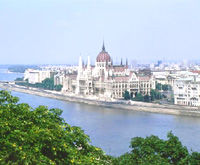
Király Baths
One of the most beautiful baths to have survived from the Turkish period (16th century).
The establishment sustained severe damage during WWII, and only reopened in 1959.
The waters are indicated for chronic spinal and articular complaints, but effective for inflammatory spiral diseases, too.
The composition of water: calcium-hydrogen-magnesium-carbonate, the hotter springs contain fluoride, sulphur and chloride.
|
 |

Danubius Thermal Hotel
There are 2 buildings located in the picturesque Margaret Island. These are connected by
an underground corridor and share the medical facilities. Picture shows the Danubius Thermal Hotel, which is a modern building designed by Finnish architects. It offers fitness options in addition to
the medical equipments. It takes the water supply from thermal springs on the island.
The Hungarian Olimpic champions club meets here regularly.
the Grand Hotel offers a special advantage: its in-house trained doctors are complemented by specialists who can be called on a wide variety of areas. (neurosurgery, sport surgery, cardiology, etc..)
| |


Rudas Baths
The springs feeding the Rudas Baths have been known to men ever since the area was settled. The present thermal bath was built in the 16th century, by Pasha of Buda Sokoli Mustapha, since when it has been operated virtually unchanged to this day. The baths are fed by 3 famous springs: Juventus,
Attila and Hungaria and 15 smaller springs. The lightly radioactive, calcium-magnesium-hydrogen-carbonate
waters contain sulphates and fluoride. The water of the Juventus spring that can be utiliyed as bath form has rejuvenating effects, hence the name.
Waters here can be taken as drinking cure, too.
| |


Szechenyi Baths
The central section of the bath was started in 1909. The complex was ceremonially
opened in 1913. In 1927 a strand and a swimming pool were added making it that time's Europe largest spa centre, and it is still one of the largests.
The most attractive part of the complex is the cupola hall at the main entrance.
decorated with beautiful glass mosaics. Just a few meters from the building one comes across the pump room, supplying cooled water direct from the springs.
| |


Gellért Baths
Budapest's most famous baths, and one of the symbols of the city. The medical
springs of the site have been utilized for 2000 years. Today's building was erected
during WWI. This is one the very few baths in Europe built in Art Nouveu style.
The water is taken from more than 10 springs. The baths are combined with the world famous Gellert-Hotel, which offers its guests a full range of services.
|









